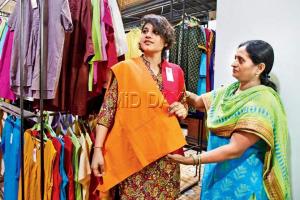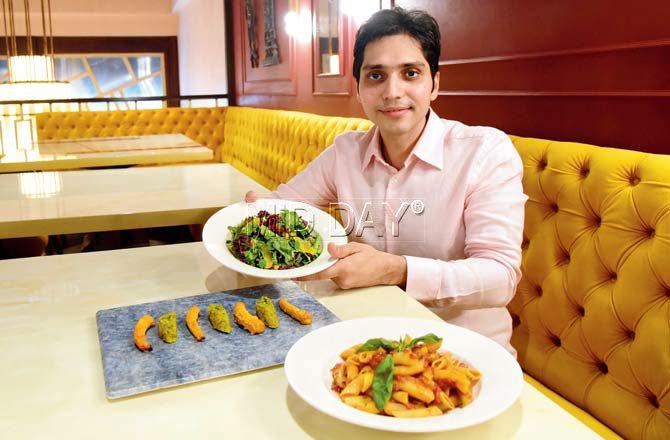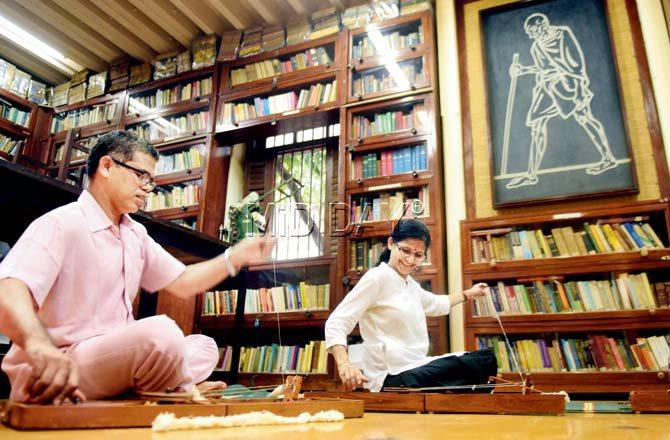As the country enters the 150th year of Mahatma Gandhi's birthday, Anju Maskeri meets four Mumbaikars who carry his legacy without a badge

Arnaz Khan says she makes it a point to buy garments from Khadi Bhandar in Fort in order to promote the indigenous fabric. Pic/Suresh Karkera
'Gandhi is a buffet. You pick what works best'
Arnaz Khan, 21, Builds leadership skills among youth through community service
ADVERTISEMENT
Khan, who works with the Blue Ribbon Movement, a Mumbai-based social organisation, was 15 years old when she first picked up Gandhi's autobiography, The Story Of My Experiments With Truth. She laboured through it and gave it up halfway. “At the time, it seemed like a farfetched philosophy, so I left it at that,” says Khan, now 21. A couple of years later, while cleaning the book shelf at her Mahalaxmi home, the Sophia College alumna chanced upon the book again. This time, she decided to give it another chance. And, that made all the difference.
It's only in the second reading that Khan says she was able to cut through the noise and catch things that she didn't the first time. “It helped humanise Gandhi because until then, the education system had painted an unsullied image of him. But here was a man, who was grappling with moral dilemmas, and was honest about it,” she says.
In the last five years, Khan has devoured literature on the leader, including Hind Swaraj, and Ethical Religion (authored by Gandhi), Selected Letters, volume-4 from Selected Works of Mahatma Gandhi, which contain letters written by Gandhi from time to time to MA Jinnah, and Bapu Kuti: Journeys in Rediscovery of Gandhi by Rajni Bakshi, which delves into Gandhi's approach to development, science, technology, economy, and democracy. Today, her work involves building a tribe of young change makers through local civic projects.
It includes skill-building sessions, constructive dialogue, awareness activities, and action projects in collaboration with civic authorities and local communities. “It's serendipitous how my readings of Gandhi, organically led me to network with people working in the field of community development and social change. It was almost like how Munnabhai started seeing Gandhi everywhere in the movie,” she laughs, talking about her interactions with Rajagopal PV, the son of a Gandhian worker and chairman of Ekta Parishad, a three-decade-old Bhopal-based non-profit that works towards raising issues of land rights, and members of Nai Talim, which promotes the use of the world as classroom.
Khan admits that while engaging in discussions around Gandhi, it's difficult to separate the icon from the man. “It invariably crops up and leads to heated debates. And, I've had several internal battles when I read about his celibacy oath. But he never claimed to be perfect. In fact, he was open about his follies. Honestly, he was a living paradox,” she says. Also, being a 21-year-old who publicly espouses Gandhian philosophy, comes with its fair share of barbs. She admits to having been called a hypocrite. “When I rally against increasing consumerism, friends say, why do you use a phone and ride a bike. But, I'm no Gandhi. I try my best to follow his ideals. For many, including me, Gandhi is a buffet. You pick what works best for you,” she says.
'Had to spread message of vegetarianism through actions'
Marzy Parakh, 33, Restaurant owner
Two years ago, when restaurateur Marzy Parakh decided to change his three successful, meat-serving restaurants, Volare, Gourmet 64 and Pala Fala, into vegetarian joints, he was met with disapproval from family and friends. “They couldn't believe I was doing this to my profitable ventures simply because of my personal leanings,” says Parakh, who grew up in a Parsi household where chicken was cooked almost every day. His inclination towards vegetarianism eight years ago, and then his turn to veganism in 2016, married well with Gandhi's philosophy — something that Parakh started delving into deeply after college. His relationship with the leader's principles was one that gradually “grew on” him.

Marzy Parakh. Pic/Suresh Karkera
“For most of us, the first introduction to Gandhi is in school. It's only later, when I took up some serious reading on the subject, that I began to relate to him. Having said that, I wasn't reading literature to become like him. I just felt there were parallels between us on a micro level,” he says. Gandhi believed in being the change he wished to see in the world, and one such change was his vow never to consume meat, milk or milk products. This resonated with the 33-year-old. “I realised I couldn't follow a vegan diet while making profits by dishing out non vegetarian food at my restaurants. It was hypocrisy. I had to spread the message of vegetarianism through my actions,” he says.
A couple of years ago, Parakh also launched a charitable trust for people with disabilities called Faith Foundation, through which he wanted to make corporate social responsibility the main goal of his venture. “He believed in the bottom up approach, which I could replicate by helping an alienated section of society get access to mainstream,” he says. He does this by giving them a role in the kitchen as well as helping them set up their own businesses.
'The charkha is a tool of community building and self reliance'
Rajashri Choche, 45 Teaches charkha at Mani Bhavan
Every Friday, between 3 pm and 4 pm, Wadala resident Rajashri Choche has her calendar blocked for charkha enthusiasts. She, along with her motley bunch of students that includes lawyers, doctors, advocates and students, meet at Mani Bhavan, Gamdevi, and spend time with the spindle. “I remember being thrilled the first time I saw 10 students in a class two years ago. I hadn't expected more than two,” laughs the 44-year-old.

Rajashri Choche. Pic/Bipin Kokate
For Choche, the charkha is more than a symbol of patriotism. It's a living, pulsating apparatus that has been a constant in her life since 1996. Back then, she had joined Bombay Sarvodaya Mandal and Gandhi Research Foundation, Nana Chowk, as an accountant. But, within months, Choche found herself straddling the role of a student along with that of a clerk.
“It was only natural considering I was in the company of intellectuals such as Eli Gadkar, Kantibhai Shah and Hansaben Majgaonkar, whose every action was informed by Gandhi's values of non-violence and swarajya. I was a sponge passively soaking in their ideas while going about my work,” she recalls. For her, there was an unmistakable sense of belonging, having grown up around her aunt, Sunanda Kaluste, who was a staunch Gandhian, and in a household where the charkha was used as frequently as the chulha. “Of course, I was too young to understand nuances of what my aunt would discuss. But she laid the foundation.”
Back at the Mandal, Choche would watch senior members sit cross legged on the floor with the charkha, spin their own yarn and then fashion it into fabric. One morning, she decided it was time she learnt the art. “I was aware that Mr Gadkar had taught the charkha to many enthusiasts. In fact, the spindle was an extension of him. So I went up to him and requested that he teach me,” she says. Expectedly, the activist was more than happy to induct a new student. Every day, she would take an hour's break for these lessons.
In three months, Choche was able to spin her own yarn. Today, she is trying to spread the art. She also visits Matunga's Shishuvan School, where the uniform is khadi, to teach charkha-spinning and weaving to students from Std V to Std X. Strangely, not many get Choche's passion. “I realised it takes a certain sensibility to appreciate this in today's day and age. It's easy to make fun of the work I do because it's seen as archaic.” However, she is vociferous when it comes to defending the relevance of the spindle. “It's a tool of community building and self reliance. I make a living out of this. All you need to do is take time out to learn,” she says.
'Gandhi's agrarian approach has always appealed to me'
Delzaad Deolaliwala, 28, Co-founder of Boheco
As a co-founder of The Bombay Hemp Company (Boheco), India's first industrial and medicinal hemp (cannabis) firm, Deolaliwala looks after the non-profit arm of the business called Ahtulya Krishi Foundation. Here, he assists farmers in improving their socio-economic conditions by utilising cultivation of cannabis for industrial, construction, and pharmaceutical purposes. In this, he is guided by a pearl of wisdom that Gandhi uttered — “to forget how to dig the earth and tend the soil is to forget ourselves”.

Delzaad Deolaliwala
“Gandhi's agrarian approach has always appealed to me. He was a leader who made a big impact because I hail from an agriculture family. My uncle nurtures a chikoos plantation in Dahanu. I was inclined towards working in a field where I was assisting indigenous farming,” he says.
So drawn was Deolaliwala to doing something in the field, that after graduation, he teamed up with his college mates to start the company. “We found out that 70 per cent of the Indian workforce is agricultural. However, their contribution to the economy is a mere 13 to 14 per cent. I felt it was necessary to give impetus to farming and empower farmers,” he says.
By January 2013, Boheco was founded. Setting up a business that involves growing a plant that belongs to the family of marijuana was far from easy. “Of course, there are legal issues and greasing palms was not an option. We were ready to do what it took to do it without compromising on ethics,” he says. But isn't growing cannabis — an intoxicating substance — in conflict with the ideals of Gandhianism? “Hemp is regulated to only contain a max THC level of 0.3 per cent, essentially making it impossible to feel any psychoactive effect or get a “high”,” he says.
Catch up on all the latest Mumbai news, crime news, current affairs, and also a complete guide on Mumbai from food to things to do and events across the city here. Also download the new mid-day Android and iOS apps to get latest updates
 Subscribe today by clicking the link and stay updated with the latest news!" Click here!
Subscribe today by clicking the link and stay updated with the latest news!" Click here!






